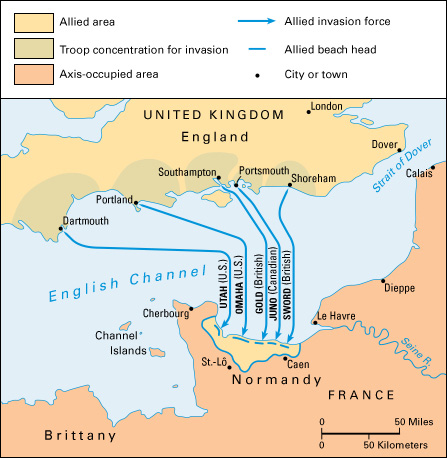Normandy, Battle of, was fought between Allied and German forces during World War II (1939-1945). The battle began on June 6, 1944—a date known as D-Day—with the largest seaborne invasion in history. For the next two months, Allied and German troops struggled for possession of Normandy, a region in northwestern France. At the time of the invasion, Nazi Germany controlled France and most of western Europe. The fighting in Normandy continued late into August and ended with an Allied victory.
The vast majority of the invading Allied troops were from Canada, the United Kingdom, and the United States. Soldiers from other countries, including Australia, Belgium, Czechoslovakia (now the Czech Republic and Slovakia), France, Greece, the Netherlands, New Zealand, Norway, and Poland also participated. General Dwight D. Eisenhower of the United States commanded the Allied invasion, code named Operation Overlord. The Allied troops left from bases throughout southeastern England and crossed the English Channel on thousands of ships. They encountered fierce German resistance—commanded by Field Marshal Erwin Rommel—but eventually secured the Normandy beaches.

By July 1944, over 1 million Allied troops were ashore in Normandy, with nearly 3 million soldiers, sailors, and aviators participating throughout the preparation and course of the battle. Heavy fighting occurred around the towns of Caen, Cherbourg, and Saint-Lô, among other places. In late August, the Battle of Normandy concluded following the encirclement and capture of more than 50,000 German troops around the village of Falaise. The closing of the Falaise Gap—the German path of escape—allowed for the liberation of Paris and the Allied push to the German border.
Loading the player...Invasion of France
The cost of the Normandy campaign was high for both sides. The Allies suffered over 209,000 casualties, including about 50,000 killed. German killed and wounded are estimated at well over 200,000, with another 200,000 captured. About 15,000 French civilians were also killed. Today, war cemeteries throughout Normandy hold the remains of over 110,000 dead from both sides.
